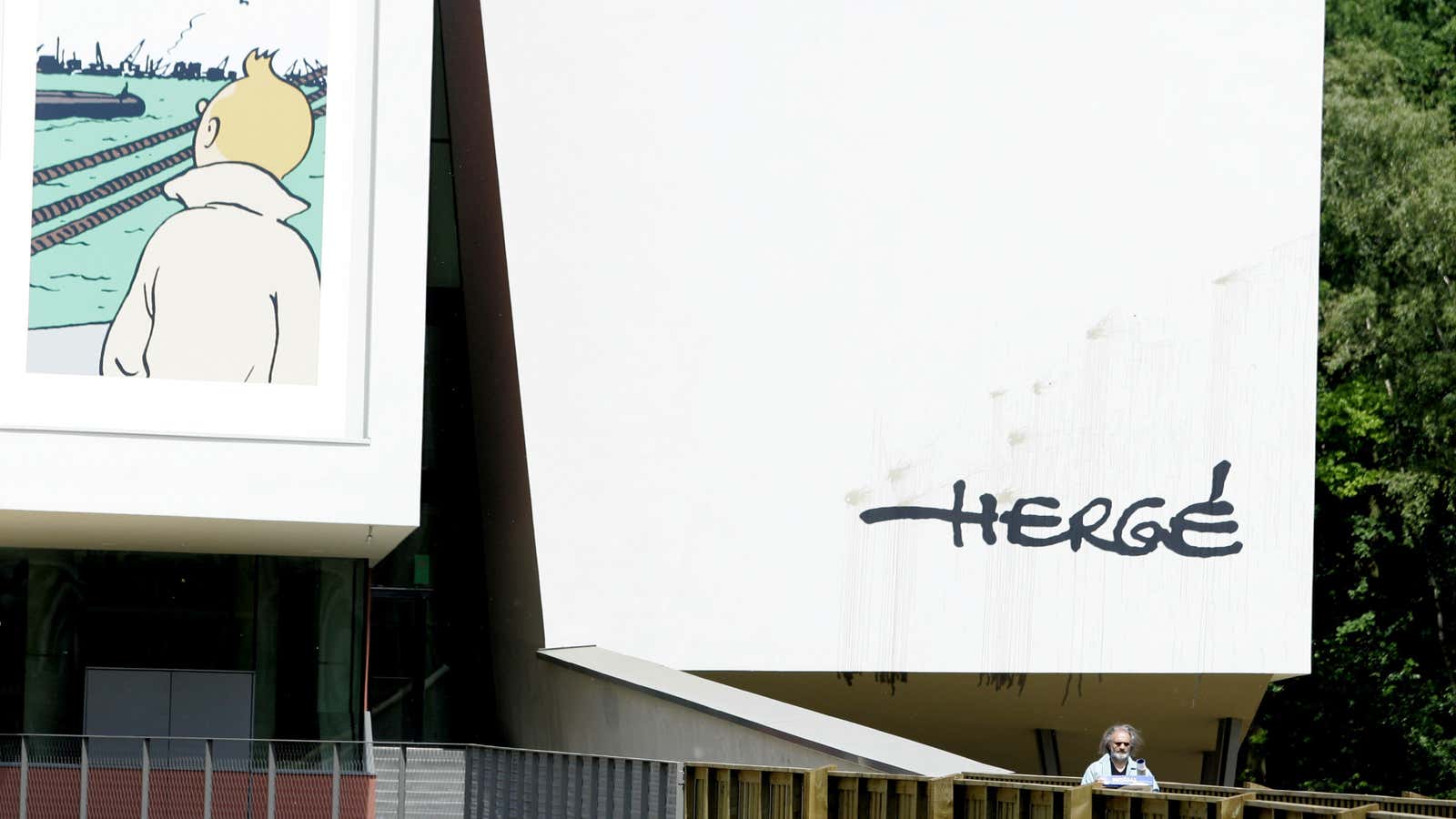In the hours following this week’s attacks on Brussels, with at least 31 dead and 200 injured according to the Associated Press, sympathetic tweeters from around Europe turned to a classic Belgian hero. Social media posts showed Tintin, protagonist of the comic book series The Adventures of Tintin, shedding a tear for the violence in his native Brussels.
Tintin, a world-traveling baby-faced journalist, is a massively popular childhood figure globally, particularly in Europe. Through his adventures, published in 70 languages, hundreds of millions of young readers have traveled to China, the Soviet Union, and even the moon.
For young Europeans, Tintin was an introduction to the rest of the world and a window into the century’s historical, ideological, and geopolitical shifts: Georges Rémi, who published under the name Hergé (a reversal of his initials, G.R.) debuted Tintin in 1929. The exploits of the beloved comic character, who was admired for his Boy-Scout ethics, reflected each decade’s geopolitical change, beginning with Tintin’s visit to Stalinist Moscow in the late 1920s through to his final trip in 1976 to a fictional South American country amidst a coup.
Today, Hergé’s plain, earnest, orange-haired hero has become an icon of the city of Brussels—now the center of European government—and lives on in monuments and sales across the continent.
In many ways, he has come to represent a certain version of Europe’s self-image. In 2008, The Economist described Tintin as “a very European hero,” noting his un-American civility:
Tintin is not an outsider, or a rebel against the established order. He defends monarchs against revolutionaries (earning a knighthood in one book). His first instinct on catching a villain is to hand him over to the nearest police chief. He does not carry his own gun, though he shoots like an ace. Though slight, he has a very gentlemanly set of fighting skills: he knows how to box, how to sail, to drive racing cars, pilot planes and ride horses. He has few chances to rescue girls or women, moving in an almost entirely male, sexless world, but is quick to defend small boys from unearned beatings.
In 1969, French regional newspaper L’Est républicain named Hergé “the Belgian of all countries”:
[Hergé] is and proud to be Belgian, as one is proud to be from a small country marked by three civilizations (Latin, English and German), which gives him a certain vantage point while having above all a true European spirit.
As the everyman of Europe, Tintin seems to resonate still. When Hergé died in 1983, the French daily Liberation commemorated his lasting impact with a special issue in which images were replaced with cartoons. To preserve his legacy, in 2009, Brussels’s Hergé Foundation opened a €15 million (about $16.8 million) museum in the artist’s honor, designed by Pritzker Prize-winning architect Christian de Portzamparc. The 2011 movie based on Tintin’s adventures, directed by Steven Spielberg and produced by Peter Jackson, grossed $296 million in theaters outside the US.
Tintin was known for a plucky sense of exploration abroad—the same spirit that took him to the moon 15 years before anyone in real life had set foot there. In a moment where Europe’s unity hangs in a fragile balance—as the EU faces its economic and refugee crises, and under threat that one of its most powerful members will leave the union—Tintin might be a reminder of the kind of vintage cosmopolitanism that “European” once evoked in the world order.
But maybe it’s not this gentleman of times past that the EU needs, as it struggles with new inhabitants, country in-fighting, and debt at home. Much has changed since the days that Tintin visited China on the brink of war with Japan wearing a mandarin hat—and indeed the days since racist and Orientalist depictions of people from non-white cultures was the norm.
Today, young readers have access to realtime images of the earth from space, and to direct contact with people from other cultures and countries. Rather than an explorer’s eye view on the world, they need a character that can help them make sense of cultural and political shifts at home—and perhaps shed a tear, when necessary. As terror attacks designed to create chaos lead to the reimposition of border controls and spur increasingly xenophobic grandstanding, it’s time for a new European hero—a multi-voiced traveler who’s ready to return from adventures abroad to help heal, and rebuild his home.
